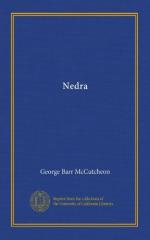“Where is he? I’ll, take the emotion out of him in short order. Ah, ha! Don’t look frightened! I understand. You love him. I see it all. It’s as—”
“Stop! You have no right to say that,” she exclaimed, her eyes flashing dangerously. His heart smote him at once and he sued humbly for pardon. He listened to her views concerning the hapless Indianian, and it was not long before he was heart and head in sympathy with Veath.
“Poor fellow! When I told him last night that I was to be married within a year he actually trembled from head to foot. I never was so miserable over a thing in my life,” she said dismally. “Really, Hugh, I can’t bear to think of him finding out how we have played with him.”
“Shall I tell him all about it?” asked he in troubled tones.
“Then I should not be able to look him in the face. Dear me, elopements have their drawbacks, haven’t they?”
Other passengers joined them, Veath and Lady Huntingford among them. In the group were Captain Shadburn, Mr. and Mrs. Evarts, Mr. Higsworth and his daughter Rosella, Lieutenant Hamilton—a dashing young fellow who was an old and particularly good friend of Lady Huntingford. Hugh noted, with strange satisfaction, that Hamilton seemed unusually devoted to Miss Higsworth. In a most casual manner he took his stand at the rail beside her Ladyship, who had coaxed Captain Shadburn to tell them his story of the great typhoon.
Presently, a chance came to address her.
“Grace tells me that your name is an odd one, for a girl—woman, I mean—Tennyson. Were you named for the poet?”
“Yes. My father knew him well. Odd, isn’t it? My friends call me Lady Tennys. By the way, you have not told Grace what I told you last night on deck, have you?” she asked.
“I should say not. Does she suspect that you know her secret and mine?” he asked in return.
“She does not dream that I know. Ah, I believe I am beginning to learn what love is. I worship your sweetheart, Hugh Ridgeway.”
“If you could love as she loves me, Lady Huntingford, you might know what love really is.”
“What a strange thing it must be that you and she can know it and I cannot,” she mused, looking wistfully at the land afar off.
At Aden everybody went ashore while the ship coaled at Steamer Point, on the western side of the rock, three miles from the town proper. Multitudes of Jewish ostrich-feather merchants and Somali boys gave the travellers amusement at the landing and in the coast part of the town. The Americans began to breathe what Hugh called a genuinely oriental atmosphere.
They were far from Aden when night came down and with it the most gorgeous sunset imaginable. Everybody was on deck. The sky was aflame, the waters blazed and all the world seemed about to be swept up in the wondrous conflagration. Late in the afternoon a bank of clouds had grown up from the western line, and as the sun dropped behind them they glowed with the intensity of fiercely fanned coals of huge dimensions. At last the fiery hues faded away, the giant holocaust of the skies drew to an end, and the soft afterglow spread across the dome, covering it with a tranquil beauty more sublime than words can paint.




